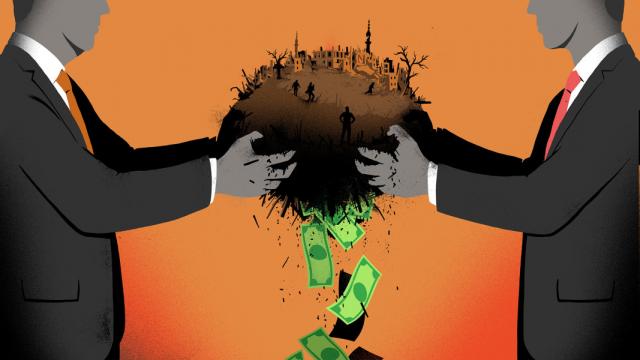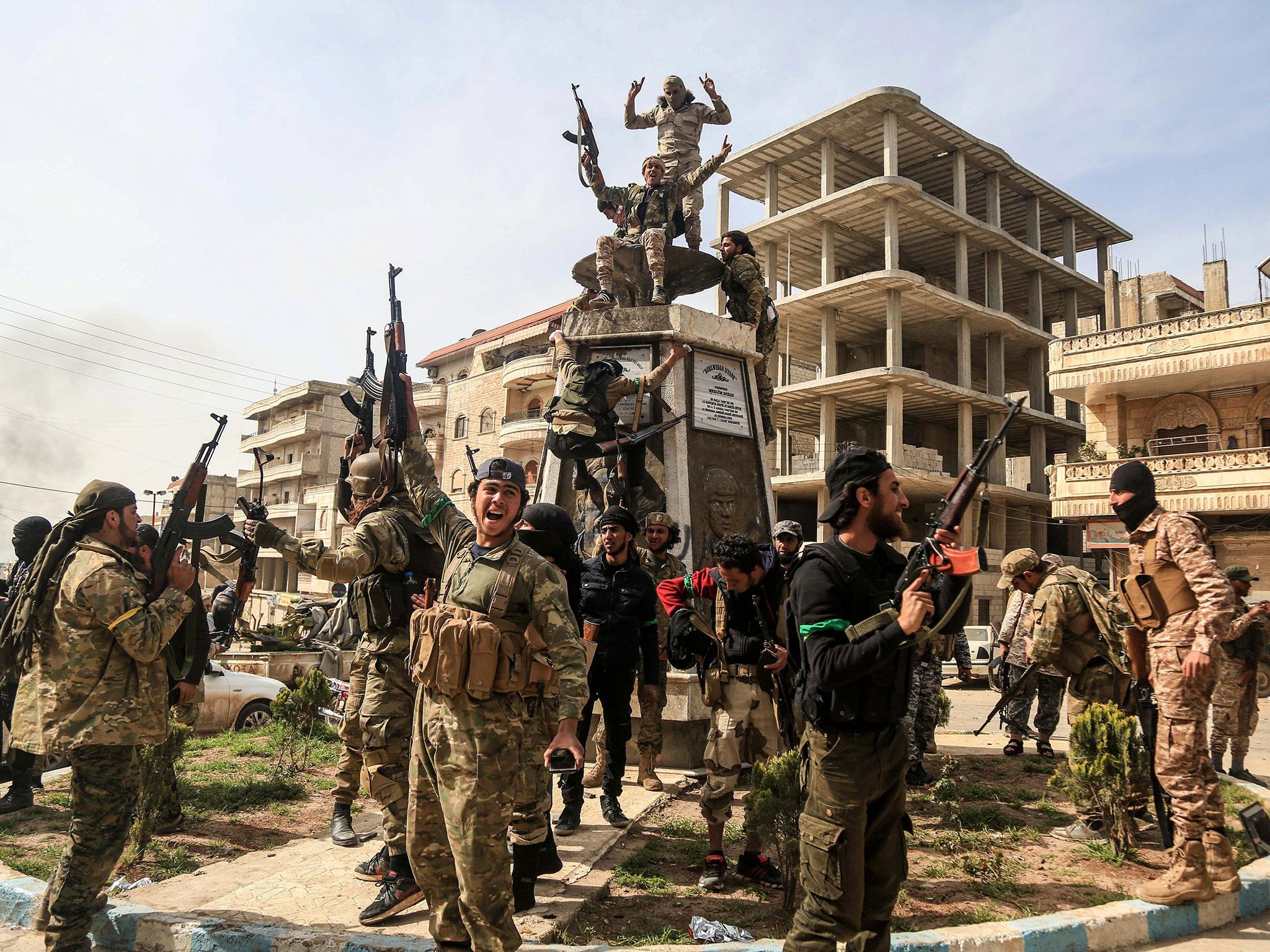
This is the third installment in a series about extending the Green New Deal to confront multiple global crises. Read Part I about tackling environmental racism and Part II about beating the far-right.
Turkey's attack on the Rojava region of Syria demonstrates the atrocious nature of President Recep Tayyip Erdoğan's regime. Despite its increasing authoritarianism, Turkey is a NATO member and ally to the US and EU. Since 2018, it has committed war crimes in Rojava's Afrin canton, using napalm and cluster bombs.
A catalogue of evidence shows Turkey supports ISIS, including its recruitment of ex-ISIS and Al Qaeda fighters to invade Rojava as mercenaries, repeating the Afrin invasion.
Evidence of war crimes are also visible in the latest attack on Rojava, including the execution of Kurdish leader Hevrin Khalaf, indiscriminate killings of civilians, and reported use of banned weapons like white phosphorous.
Domestically, Turkey has meanwhile imprisoned journalists and opposition leaders en masse since 2015, and stands accused of widespread murder and other war crimes in Bakur, Turkish Kurdistan.
Turkey has a long history of persecuting the Kurds. President Erdoğan has even announced that the goal of his latest invasions is changing Rojava's population, in other words, ethnic cleansing. Yet the United Nations, Europe, the US and other allies' condemnation has been slow and weak. The UN could not condemn Turkey's attack due to Russian veto power. And the EU left it to individual member states to decide about their arms exports to Turkey.
Trump's response in particular has been chaotic. He green-lighted the invasion and withdrew US troops that had been supporting the Kurdish-led Syria Defense Forces to defeat ISIS, and since issued partial sanctions against Turkey while calling for a cease-fire. He has not involved or consulted with the Kurds.
What is muting global powers' criticism of the Turkish-ISIS invasion? The answer is plainly money. The capitalist system is as ruthless as the Turkish state.
Blood on their hands
Turkey outguns Rojava with US-built Lockhead Martin F16 jets, Boeing chinock helicopters and Raytheon patriot missiles. These are the world's big three military companies. Fourth largest is UK-based BAE Systems. US-based Northrop Grumman and General Dynamics follow, making billions of dollars selling their arms to the Turkish air force, as do other big arms dealers. Turkey's Leopard tanks are German, while Anglo-Italian AgustaWestland sends it helicopters and France's Thales supplies it with missiles.
In other words, global arms dealers are earning billions of dollars from Turkish-ISIS actrocities. One of the Kurds' key requests – beyond suspending all arms sales – is the establishment of an international no-fly zone. This would prohibit Erdoğan from using the many areal weapons built in the US and Europe to commit war crimes.
The question many are now asking is how we, the public, can stop a situation where death is becoming a multi-billion dollar business in Rojava and beyond. One way is to expand the Green New Deal.
Dismantling the war machine
Green New Deal advocates argue for a WWII-style mass mobilization towards green industry. But why not dismantle the very war machine, expanded since the 1940s, which President Eisenhower dubbed the military industrial complex?
From a climate perspective, wars use a lot of oil. The Pentagon is the single biggest institution using fossil fuels.
War is also driven by big oil's unquenchable thirst for oil. This was clearly shown in oil majors' lobbying for the US-led Iraq invasion in 2003.
The arms industry systematically ties war and oil, as ams firms sell to global powers on the open market – meaning whoever will buy. This has made oil states like Saudi Arabia key customers. Billionaires regain the petrodollars, and states like Turkey also buy weapons; meanwhile, the US and European nations facilitate the process, both for the money and also because it makes them strategic allies who can exert power across the Middle East.
This forms a self-perpetuating vicious cycle. Arms companies make more money, affording greater influence over governments. In turn the weaponry empowers the biggest arms buyers. In 2018, total military expenditure was estimated at $1.8 trillion, with the US alone responsible for 36 percent of all arms exports.
Breaking the cycle
By moving towards a zero-carbon economy we would decrease the need for oil, wars fought for oil and opportunities for arms dealers. This could be catalysed by broadening the Green New Deal goals of making an ecologically and socially just economy. Lockhead Martin factories and their expertise building jets, missiles and other infrastructure of war could instead make renewables, mass transit and other necessary infrastructure for an ecologically sound future.
As this series will explore, there are multiple mechanisms to pay for the Green New Deal. Using defense spending is one avenue, as is diverting the massive subsidies given to the arms industry. In the US, total defense spending is estimated at nearly $800 billion per year. So how could we turn a factory building helicopter blades into one that makes wind turbines?
We can borrow existing GND ideas about what to do with the oil industry. One proposal is to nationalise these industries. We could then upcycle the machinery and infrastructure and mobilise the skills to drive the Green New Deal.
Beyond this, there are calls to make big oil pay for their climate impacts through reparations and litigation. This line of thinking can be followed: just as big oil has known about its climate impact for years, arms industry CEOs know the deaths their machines cause.
Through legal mechanisms and global justice, we must call out the pivotal role the arms industry plays in a global system based on war. We could use the courts to confiscate the infrastructure and profits and stop destroying the world.
Instead, we could move towards a future embodied by Rojava: ethnic harmony, not ethnic cleansing. As Occupy.com has covered before, since 2012 the Kurds have been building a society based on common humanity. Rojava is a women-led revolution where bottom-up democratic councils hold sovereignty.
Based on cooperatives, it is an anidote to capitalism's crises. Rojava even offers a peaceful bottom up solution to the Syrian war, based on ethnic and religion cohesion.
Across the world, we need to stand in solidarity with the revolution that offers hope for a democratic, ecologically sound, feminist society – not betray it to profit an industry that offers us no future.












